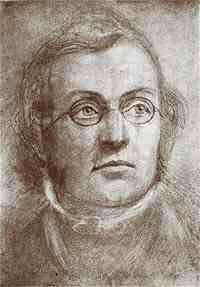
To endure is greater than to dare; to tire out hostile fortune; to be daunted by no difficulty; to keep heart when all have lost it; to go through intrigue spotless; and to forgo even ambition when the end is gained — who can say this is not greatness?
William Makepeace Thackeray (18 July 1811 – 24 December 1863) was an English Victorian writer.
Quotes
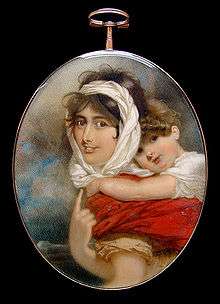
Mother is the name for God in the lips and hearts of little children.
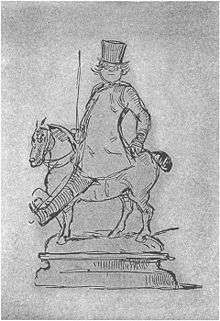
Good humour may be said to be one of the very best articles of dress one can wear in society.
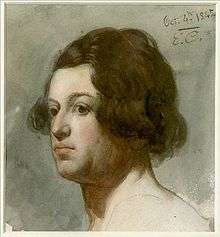
How hard it is to make an Englishman acknowledge that he is happy!
- Let the man who has to make his fortune in life remember this maxim. Attacking is his only secret. Dare, and the world always yields: or, if it beat you sometimes, dare again, and it will succumb.
- The Luck of Barry Lyndon (1844), Ch. 13.
- The unambitious sluggard pretends that the eminence is not worth attaining, declines altogether the struggle, and calls himself a philosopher. I say he is a poor-spirited coward.
- The Luck of Barry Lyndon (1844).
- He who meanly admires mean things is a Snob.
- The Book of Snobs (1848), ch. 2.
- The true pleasure of life is to live with your inferiors.
- The Newcomes (1853-1855), Ch. 9.
- What money is better bestowed than that of a schoolboy's tip? How the kindness is recalled by the recipient in after days! It blesses him that gives and him that takes.
- The Newcomes, Ch. 16.
- The wicked are wicked, no doubt, and they go astray and they fall, and they come by their deserts: but who can tell the mischief which the very virtuous do?
- The Newcomes, Ch. 20.
- This Bouillabaisse a noble dish is —
A sort of soup or broth, or brew,
Or hotchpotch of all sorts of fishes,
That Greenwich never could outdo.- Ballads, The Ballad of Bouillabaisse, st. 2 (1855).
- She looks so haughty that I should have thought her a princess at the very least, with a pedigree reaching as far back as the Deluge. But this lady was no better born than many other ladies who give themselves airs; and all sensible people laughed at her absurd pretensions.
- The Rose and the Ring (1855), Ch. 2.
- Good humour may be said to be one of the very best articles of dress one can wear in society.
- Sketches and Travels in London; Mr. Brown's Letters to his Nephew: "On Tailoring — And Toilettes in General" (1856).
- Stupid people, people who do not know how to laugh, are always pompous and self-conceited.
- Sketches and Travels in London; Mr. Brown's Letters to His Nephew: "On Love, Marriage, Men and Women" (1856).
- Except for the young or very happy, I can't say I am sorry for any one who dies.
- Letter to Mrs. Bryan Waller Procter (26 November 1856), from The Letters and Private Papers of William Makepeace Thackeray, ed. Edgar F. Harden [Garland Publishing, Inc., 1994, ISBN 9780824036461], vol. 1, p. 763.
- Despair is perfectly compatible with a good dinner, I promise you.
- Lovel the Widower (1860), Ch. 6.
- The play is done; the curtain drops,
Slow falling to the prompter’s bell
A moment yet the actor stops
And looks around to say farewell.
It is an irksome word and task:
And when he’s laughed and said his say
He shows, as he removes the mask,
A face that’s anything but gay.- The End of the Play, reported in Bartlett's Familiar Quotations, 10th ed. (1919).
- Christmas is here:
Winds whistle shrill,
Icy and chill.
Little care we;
Little we fear
Weather without,
Sheltered about
The Mahogany Tree.- The Mahogany Tree, reported in Bartlett's Familiar Quotations, 10th ed. (1919).
- Werther had a love for Charlotte
Such as words could never utter;
Would you know how first he met her?
She was cutting bread and butter.- Sorrows of Werther, reported in Bartlett's Familiar Quotations, 10th ed. (1919).
- Charlotte, having seen his body
Borne before her on a shutter,
Like a well-conducted person,
Went on cutting bread and butter.- Sorrows of Werther, reported in Bartlett's Familiar Quotations, 10th ed. (1919).
- Ho, pretty page, with the dimpled chin
That never has known the barber’s shear,
All your wish is woman to win,
This is the way that boys begin.
Wait till you come to Forty Year.- The Age of Wisdom, reported in Bartlett's Familiar Quotations, 10th ed. (1919).
- Then sing as Martin Luther sang,
As Doctor Martin Luther sang,
“Who loves not wine, woman and song,
He is a fool his whole life long.”- A Credo, reported in Bartlett's Familiar Quotations, 10th ed. (1919).
- How hard it is to make an Englishman acknowledge that he is happy!
- Pendennis. Book ii. Chap. xxxi, reported in Bartlett's Familiar Quotations, 10th ed. (1919).
- I should like to see before I die, and think of it daily more and more, the commencement of Jesus Christ's christianism in the world, where I am sure people may be made a hundred times happier than by its present forms, Judaism, ascenticism, Bullarism.
- Thackeray, William Makepeace. Nov. 1840, A Collection of Letters (1887). Ardent Media. p. 36.
Vanity Fair (1847–1848)

The world is a looking-glass, and gives back to every man the reflection of his own face.
- The world is a looking-glass, and gives back to every man the reflection of his own face. Frown at it, and it will in turn look sourly upon you; laugh at it and with it, and it is a jolly kind companion; and so let all young persons take their choice.
- Vol. I, ch. 2.
- This I set down as a positive truth. A woman with fair opportunities, and without a positive hump, may marry whom she likes.
- Vol. I, ch. 4. Compare: "I should like to see any kind of a man, distinguishable from a gorilla, that some good and even pretty woman could not shape a husband out of", Oliver Wendell Holmes, Sr., The Professor at the Breakfast Table; "The whole world is strewn with snares, traps, gins and pitfalls for the capture of men by women", Bernard Shaw, Epistle Dedicatory to Man and Superman.
- Here was a man who could not spell, and did not care to read — who had the habits and the cunning of a boor: whose aim in life was pettifogging: who never had a taste, or emotion, or enjoyment, but was sordid and soil; and yet he had rank, and honors, and power, somehow: and was dignitary of the land, and a pillar of the state.
- Vol. I, ch. 9.
- But oh, Mesdames, if you are not allowed to touch the heart sometimes in spite of syntax, and are not to be loved until you all know the difference between trimeter and tetrameter, may all Poetry go to the deuce, and every schoolmaster perish miserably!
- Vol. I, ch. 12.
- Some cynical Frenchman has said that there are two parties to a love-transaction: the one who loves and the other who condescends to be so treated.
- Vol. I, ch. 13.
- Whenever he met a great man he grovelled before him, and my-lorded him as only a free-born Briton can do.
- Vol. I, ch. 13.
- If a man's character is to be abused, say what you will, there's nobody like a relation to do the business.
- Vol. I, ch. 19.
- Them's my sentiments.
- Vol. I, ch. 21.
- Everybody in Vanity Fair must have remarked how well those live who are comfortably and thoroughly in debt; how they deny themselves nothing; how jolly and easy they are in their minds.
- Vol. I, ch. 22.
- Mother is the name for God in the lips and hearts of little children.
- Vol. II, ch. 2.
- I think I could be a good woman if I had five thousand a year.
- Vol. II, ch. 6.
- Ah! Vanitas vanitatum! Which of us is happy in this world? Which of us has his desire? or, having it, is satisfied? — Come, children, let us shut up the box and the puppets, for our play is played out.
- Vol. II, ch. 27.
- And as every one of their dear sex is the rival of the rest of her kind, timidity passes for folly in their charitable judgements; and gentleness for dullness; and silence -- which is but timid denial of the unwelcome assertion of ruling folks, and tacit protestantism -- above all, finds no mercy at the hands of the female Inquisition.
- The narrator, LXII
The History of Pendennis (1848-1850)
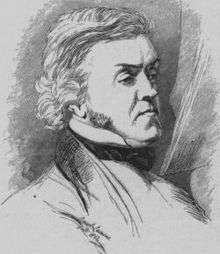
It is best to love wisely, no doubt; but to love foolishly is better than not to be able to love at all. Some of us can't: and are proud of our impotence, too.

If a secret history of books could be written, and the author's private thoughts and meanings noted down alongside of his story, how many insipid volumes would become interesting, and dull tales excite the reader!
- Although I enter not,
Yet round about the spot
Ofttimes I hover;
And near the sacred gate
With longing eyes I wait,
Expectant of her.- Pendennis: At the Church Gate, reported in Bartlett's Familiar Quotations, 10th ed. (1919).
- Thus love makes fools of all of us, big and little
- Ch. 4.
- It is best to love wisely, no doubt; but to love foolishly is better than not to be able to love at all. Some of us can't: and are proud of our impotence, too.
- Ch. 6.
- Yes, I am a fatal man, Madame Fribsbi. To inspire hopeless passion is my destiny.
- Ch. 23.
- Remember, it's as easy to marry a rich woman as a poor woman.
- Ch. 28.
- Of the Corporation of the Goosequill — of the Press, my boy, … of the fourth estate … There she is — the great engine — she never sleeps. She has her ambassadors in every quarter of the world — her couriers upon every road. Her officers march along with armies, and her envoys walk into statesmen's cabinets. They are ubiquitous.
- Ch. 30.
- As the gambler said of his dice, to love and win is the best thing, to love and lose is the next best.
- Ch. 40.
- If a secret history of books could be written, and the author's private thoughts and meanings noted down alongside of his story, how many insipid volumes would become interesting, and dull tales excite the reader!
- Ch. 42.
The History of Henry Esmond (1852)
- Full text online (1852)
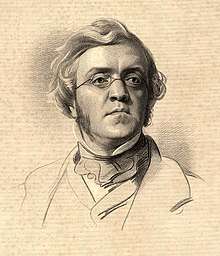
There are a thousand thoughts lying within a man that he does not know till he takes up the pen to write.
- 'Tis not the dying for a faith that's so hard, Master Harry — every man of every nation has done that — 'tis the living up to it that is difficult, as I know to my cost.
- Bk. I, ch. 6.
- 'Tis strange what a man may do, and a woman yet think him an angel.
- Bk. I, ch. 7.
- There are a thousand thoughts lying within a man that he does not know till he takes up the pen to write.
- Bk. II, ch. 1.
The Virginians (1857-1859)
- The Virginians (1857-1859)
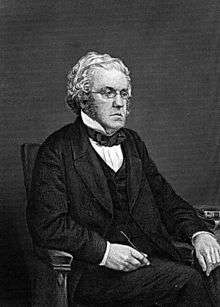
I never know whether to pity or congratulate a man on coming to his senses.
- The book of female logic is blotted all over with tears, and Justice in their courts is for ever in a passion.
- Ch. 4.
- Women like not only to conquer, but to be conquered.
- Ch. 4.
- I never know whether to pity or congratulate a man on coming to his senses.
- Ch. 56.
- Next to the very young, I suppose the very old are the most selfish.
- Ch. 61.
- To endure is greater than to dare; to tire out hostile fortune; to be daunted by no difficulty; to keep heart when all have lost it; to go through intrigue spotless; and to forgo even ambition when the end is gained — who can say this is not greatness?
- Ch. 92.
Four Georges (1860-1861)
- Bravery never goes out of fashion.
- "George II".
- It is to the middle class we must look for the safety of England.
- "George III".
- George, be a King!
- "George III"
- Said by Princess Augusta to her son, George III
Misattributed
- The two most engaging powers of an author are to make new things familiar, familiar things new.
- In this work are exhibited in a very high degree the two most engaging powers of an author. New things are made familiar, and familiar things are made new. ~ Samuel Johnson, "The Life of Alexander Pope" from Lives of the English Poets (1781)
Quotes about Thackeray
- Thackeray is everybody's past — is everybody's youth. Forgotten friends flit about the passages of dreamy colleges and unremembered clubs; we hear fragments of unfinished conversations, we see faces without names for an instant, fixed forever in some trivial grimace: we smell the strong smell of social cliques now quite incongruous to us; and there stir in all the little rooms at once the hundred ghosts of oneself.
- G. K. Chesterton, The Victorian Age in Literature (1913) [University of Notre Dame Press, 1963], Ch. II: The Great Victorian Novelists (p. 64).
External links
This article is issued from
Wikiquote.
The text is licensed under Creative
Commons - Attribution - Sharealike.
Additional terms may apply for the media files.